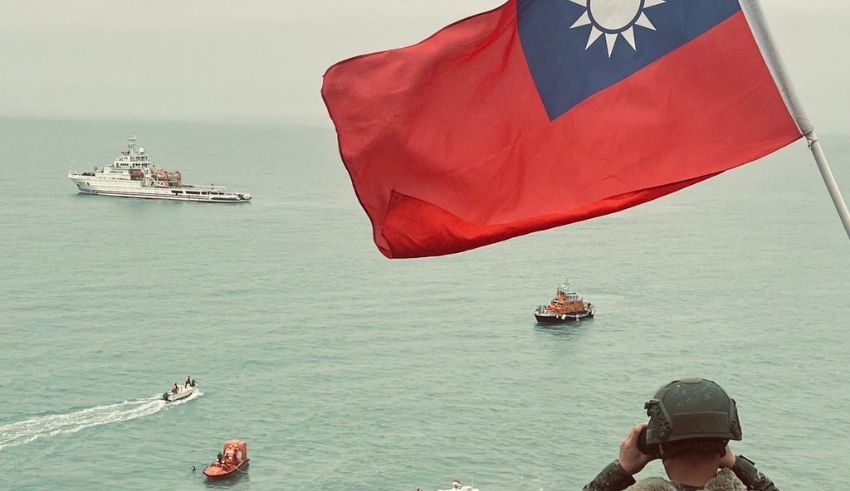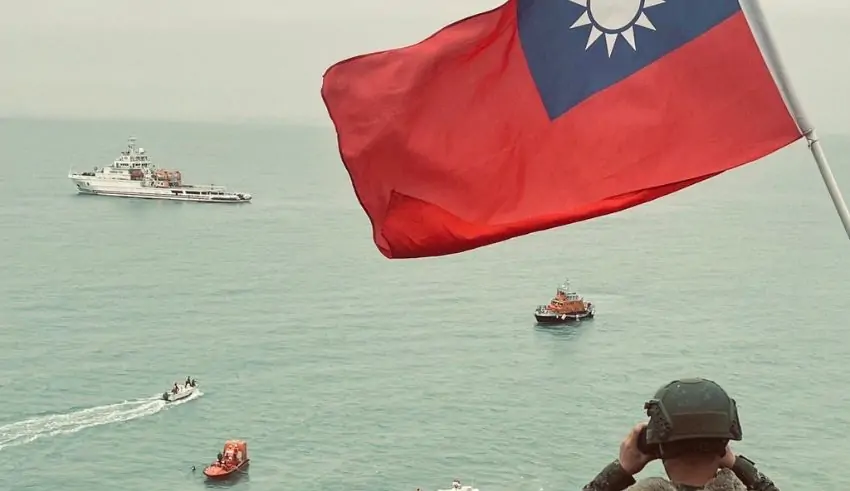

(C) Ministry of National Defencse, R.O.C.
Recent maneuvers by China have heightened tensions across the Taiwan Strait, with Beijing’s aggressive posturing raising concerns about the potential for armed conflict. The Eastern Theatre Command of the People’s Liberation Army has initiated war games to “test the ability to jointly seize power, launch joint attacks, and occupy key areas,” signaling a provocative stance towards Taiwan.
While the threat of invasion looms, experts remain divided on the likelihood of an actual conflict. A report from the Swedish National China Centre suggests that forecasts consistently rate the risk of armed conflict in the Taiwan Strait as low. This contrasts with the alarmist narrative that predicts imminent war, highlighting the complexity of geopolitical analyses. Some analysts argue that China’s actions are more about signaling and psychological warfare than a prelude to actual military engagement. They point out that an invasion would be costly and risky for Beijing, potentially leading to severe economic and political repercussions.
The Taiwan Strait has long been a flashpoint in East Asian geopolitics. Since the end of the Chinese Civil War in 1949, when the defeated Nationalist government retreated to Taiwan, the island has operated as a separate entity with its own government and economy. Despite this, Beijing views Taiwan as a breakaway province that must eventually be reunited with the mainland, by force if necessary. This historical context adds layers of complexity to the current tensions, as any move towards reunification is fraught with deep-seated political and cultural challenges.
The global community watches with bated breath as the situation unfolds. The United States and its allies have reiterated their support for Taiwan, emphasizing the importance of maintaining stability in the region. In recent months, U.S. naval operations in the South China Sea and arms sales to Taiwan have underscored this commitment. Japan, Australia, and several European nations have also voiced their concerns over China’s actions, calling for de-escalation and a return to diplomatic solutions. Meanwhile, China’s actions have drawn widespread criticism, with many viewing the military exercises as a dangerous escalation that risks miscalculation and unintended conflict.
The rising tensions have profound implications for the people of Taiwan. The specter of conflict affects everyday life, as the island’s residents prepare for potential disruptions. Civil defense drills have become more common, and the government has taken steps to bolster its military capabilities. Despite the looming threat, Taiwan’s society remains resilient, with a strong sense of identity and commitment to democratic values. The younger generation, in particular, is vocal about preserving their way of life, which starkly contrasts with the authoritarian model of governance in mainland China.
Amidst the saber-rattling, the path to peace remains fraught with challenges. Taiwan’s leader, Tsai Ing-wen, has called for calm and restraint, urging the international community to recognize the island’s sovereignty and democratic values. Tsai has also reached out to Beijing, expressing a willingness to engage in dialogue without preconditions, though these overtures have largely been rebuffed. The island’s strategic importance, coupled with its technological prowess, especially in semiconductor manufacturing, makes it a critical player in global supply chains, further complicating the stakes involved.
The tensions in the Taiwan Strait have broader implications for the Asia-Pacific region. Neighboring countries, including South Korea and the Philippines, are closely monitoring the situation, aware that any conflict could spill over and affect regional stability. ASEAN countries have called for peaceful resolution through dialogue, emphasizing the importance of maintaining open sea lanes and regional security. The situation also impacts global markets, with investors wary of the potential disruptions that a conflict could cause.
As the world awaits China’s next move, the hope for a peaceful resolution hangs in the balance. The situation in the Taiwan Strait is a delicate dance of power, diplomacy, and strategic calculations. The international community’s response, coupled with Taiwan’s resilience and Beijing’s long-term strategies, will shape the future of this critical region. The stakes are high, and the consequences of miscalculation are dire, making it imperative for all parties involved to tread carefully and prioritize diplomatic engagement over military confrontation.
BLACKPINK is planning their fourth concert tour across the globe and their brand-new album for release in 2025. Member Lisa…
The 2024-2025 BOC Life Hong Kong Premier League is a different league which is structured with triple-round robin competition every…
On May 5th the 2025 Met Gala will glitter the world through its return to The Metropolitan Museum of Art…
‘Children’s Day’ is celebrated annually on 5 May in South Korea, on this day across the nation many campaigns, creative…
May is one of the crucial financial months in a year, if you have any important transactions or any official…
If you happen to breathe K-drama, then your 'May 2025' will most likely be well-rendered into a month! Romantic sagas,…
This website uses cookies.
Read More